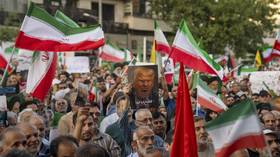President remaps federal structure, appoints head of North Caucasus
President Medvedev has established the new, North Caucasian Federal District and appointed Aleksandr Khloponin the Presidential Representative to the new district and the vice premier.
Last year, Medvedev said that the North Caucasus was Russia’s most troubled region due to corruption, unemployment and low economic development. Khloponin will be given strong authority to tackle all these problems.
44 year old Aleksander Khloponin worked as a banker when the economic reforms started in Russia in the early 1990s. After building a large and successful financial business, he moved into the metals industry and in 1996 became the head of the Norilsk Nickel corporation.
In 2001 he switched into politics and became the governor of the resource-rich Taimyr Autonomous District. In 2002 Khloponin was elected governor in the Krasnoyarsk Region in Russia’s north, and remained in that post until his appointment Tuesday as the head of the North Caucasus Federal District.
Khloponin is also a member of the political council in the United Russia party.
“I have changed the pattern of federal districts in Russia. From now on, the North Caucasian Federal District – incorporating Dagestan, Ingushetia, Kabardino-Balkaria, Karachayevo-Cherkessia, North Ossetia-Alania, Chechnya and the Stavropol region – will separate from the Southern Federal District and have the administrative center in Pyatigorsk,” Medvedev said.
“I have also appointed Aleksandr Khloponin as the Deputy Prime Minister–Presidential Representative to the North Caucasian Federal District,” the president said, adding that a situation when one person combines such two positions is “unique”.
The newly created Federal District makes it the eighth one since 2000 when then-president Vladimir Putin signed a decree “On the Envoys of the President of the Russian Federation in Federal Districts” and the country was divided into seven such areas each headed by a presidential envoy. The idea was to make the vertical management of the country more effective.
Russia is a federation which consists of 83 constituent units, which are called “subjects of the Federation”. Each Federal District includes several such subjects, but it is not a constituent unit and does not have autonomy or representatives in the Federation Council. The role of the presidential envoy is somewhat crucial. The official ensures that regional legislation is in accordance with Russian federal legislation and the constitution, works on security and economic issues, and controls the affairs of local governments. In other words, the envoy helps the government of the vast country to better control what is happening in the regions and to address problems more effectively and in time.
Khloponin, as the new envoy to the North Caucasian Federal District, will have all powers listed above and, at the same time, powers related to vice premier’s duties.
Economic methods to replace police tactics
The North Caucasus has long been a problem for Russia. Militant attacks and clashes remain commonplace, even though the 10-year-long counter-terrorism operation was declared officially over in April last year.
In an attempt to finally bring stability to the region, the Kremlin is now trying a new approach in tackling old problems: addressing social and economic issues is now in the spotlight. This explains Medvedev’s pick of the candidature.
Before the new appointment, former successful businessman Aleksandr Khloponin – previously a banker and chairman of the board of Norilsk Nickel – was the governor of the huge Krasnoyarsk region of Siberia.“I hope that in the North Caucasus you will use the experience gained while being governor in Siberia,” Medvedev said. “I believe it was a good experience and many projects, including the social-economic ones, have been a success. And that is exactly what is urgently needed in the North Caucasus.”
According to the president, law enforcement agencies achieved some success in the region and the suppression of militants is proceeding well. Nonetheless, the militants are still present. Meanwhile, the economic situation remains very difficult, which has led to a “large unemployment rate, economic crimes, clannishness and bribery.” Police methods can help to tackle these problems, but only to a certain extent, he said.
“Economic methods come to the forefront, and your experience will be in demand,” Medvedev added.
Aleksandr Khloponin thanked President Medvedev for the trust placed in him and promised to live up to expectations. Despite new huge responsibilities, the official appears to be quite confident and decisive. Speaking to journalists on Wednesday, he said he did not see any “unsolvable problems” in the North Caucasus.
He said a program of economic development of the region will be worked out in the nearest future.
The presidential envoy plans to start his new job with visiting all the regions that will comprise the new Federal District.
Before the newly appointed envoy and Deputy Prime Minister officially takes to his duties, the State Duma has to approve the amendments to the Law on Government that have already been submitted to the body by the president. Itar-Tass, citing chairman of the State Duma Constitutional Legislation and State Development Committee Vladimir Pligin, wrote that all the necessary changes to the legislation will be made rapidly.
Also, Medvedev accepted Khloponin's resignation as the governor of Krasnoyarsk region and promoted his deputy Edkham Akbulatov to the post of acting governor.
Regional leaders welcome move
The surprise announcement has been welcomed by the Chechen President, who said the North Caucasian regions will benefit economically from the creation of the new federal district.
“It will be rather a small territory, so it will be possible to reach any place from the administrative center within one day,” Ramzan Kadyrov told RIA Novosti news agency.
He expressed hope that Khloponin will focus on the construction of new industries, creation of jobs, and attracting both Russian and foreign investment.
“We are ready for close cooperation with the presidential representative,” he said. Khloponin’s appointment was backed by the state leadership, which means he is able to solve these problems, Kadyrov added.
The Chechen leader believes the region will see positive changes and the population will enjoy better living conditions.
“We will do our best to turn our district into the most beautiful and prosperous district of he Russian Federation,” Kadyrov said.
However, the Chechen president is slightly concerned over the possible reaction of investors, who are cautious whenever it comes to any changes. “I believe the federal center will help us create conditions favorable for investors, encouraging them to pour money into the region rather than abroad,” Kadyrov added.
His Ingush counterpart Yunus-Bek Yevkurov, who was wounded in an assassination attack last year, said Aleksandr Khloponin is an experienced manager and a staunch opponent of corruption.
His appointment to the post “once again confirms that the federal authorities will focus on the socioeconomic development of the region,” Ingush presidential press secretary Kaloi Akhilgov quoted the president to Itar-Tass.
President of Karachayevo-Cherkessia Boris Ebzeyev echoed his neighbors greeting Medvedev’s decision which was “much needed and long overdue.”
“I am absolutely convinced that the Governor Khloponin of the Krasnoyarsk Territory… is aware of the issues in the Russian regions and is very worried about these problems,” his press office quoted him to Interfax agency.
The leader of the Kabardino-Balkarian republic, Arsen Kanokov, also agreed that the appointment is quite successful, though “unusual”.
Khloponin has “huge experience as both a modern manager and the head of a large region,” he told Interfax. “It is also important that Khloponin is an absolutely neutral person for the North Caucasus.”
As for the creation of a new federal district, Kanokov looks at it “with optimism”. “It provides an opportunity to focus on problems of regions having similar socioeconomic conditions and problems and should help develop more efficient mechanisms for their resolution,” he said.
Why choose an outsider?
Aleksey Makarkin, Vice President of the Center for Political Technologies, described the move as a “step in the right direction. He said “it is not mere chance” that a new wave manager, rather than a military general, was appointed to the post of envoy to the North Caucasus.
“This region needs a person who has a clear idea of business interests and is able to sort out social and economic issues and create a good investment climate,” he told RT.
“On the other hand,” he went on, “this person should be an outsider, since anyone from the Caucasus would be initially associated with a particular influential group, making other regions question why their representative was not chosen.”
“Thus, no one from this region would earn the trust of all the republics included into the new federal district,” Makarkin said.
Khloponin will have to control the use of federal money and “create a balance in each of the republics between different clans”. Therefore, “the presidential envoy should not only have experience in coping with people in regions, but also be a strong personality,” both of which fits perfectly with Khloponin.
Nevertheless, since the “situation in the region is really complicated,” no big results should be expected in the nearest future.
“A lot will depend on the powers that Khloponin will be given, as well as the support from state authorities,” Makarkin said. He noted that the status the new official has is “absolutely unprecedented”.
“As envoy, Khloponin reports directly to President Medvedev, and as vice premier – to Prime Minister Vladimir Putin,” Markarkin said, adding that the explanation for such a situation is the current tandem in Russian power.
“A load off the mind” for Putin and Medvedev
The former Krasnoyarsk governor is indeed an experienced manager. However, being young and not familiar in detail with North Caucasian problems, Khloponin might face difficulties when starting his new job, Aleksey Mukhin, Director of the Center for Political Information told RT.
“But I believe he will have specialists with knowledge of the regional problems in his staff,” he said.
Being delegated authority from both Medvedev and Putin, the North Caucasian envoy will have unique opportunities which will help him in building good relations with the regional leaders, the analyst believes.
“Khloponin’s authorities are balanced. I think the president and the premier were somewhat relieved having delegated to him the duty of efficient problem-solving in the region. It was a real load off the mind,” he said.
At the same time, he continued, it will also make things easier for the leaders of North Caucasian republics. Before, they were a bit “disoriented when addressing financial or political problems,” since they did not know whether to take cue from Medvedev or from Putin. “Now there is an official who will solve all their problems,” he added.
The end of the counter-terror operation was announced almost a year ago. So the question is why Moscow did not make such an appointment back in April. According to Mukhin, the explanation for that is that the government used to build its policies relying on North Caucasian clans.
Following the end of the counter-terror operation, some “powerful Chechen clans managed to get out of direct control from military and special forces.” As a result, there has been a danger that the North Caucasian region might get separated because of internal conflicts.
“Therefore it was necessary to create a united structure and appoint a person who would be responsible for the entire region,” Mukhin said.
The creation of the new district could help bring peace to the North Caucasus, says political analyst Aleksandr Pikaev from the Institute for World Economy and International Relations.
“It was natural decision, which was dictated by real national security and national development needs,” he said.











